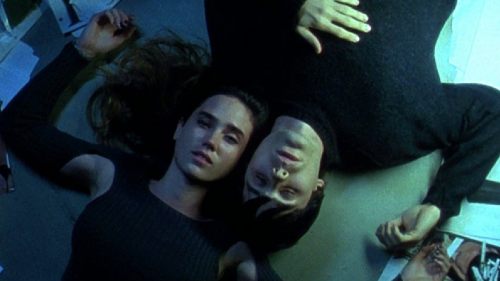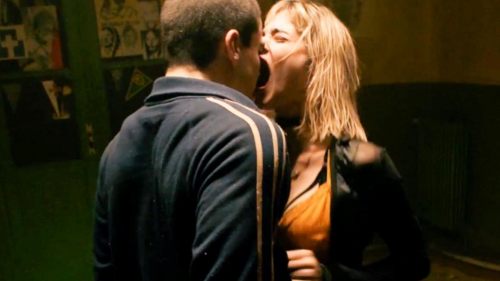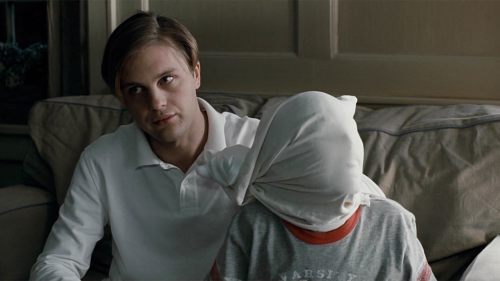Totally Fucked Up: FUNNY GAMES
The canon of cinema boasts a wealth of films that have earned the prestigious designation of “classic” and years of exhaustive praise and analysis. But beneath this esteemed catalog exists an “alt-canon” that features some of the most disturbing, provocative, unsettling, deranged, and devastating works in cinematic history. Although often just as masterful as the mainstream and arthouse classics, critics and audiences have found these movies a little harder to love. Totally Fucked Up is a weekly column that examines the films in this alt-canon and the auteurs who made them.
FUNNY GAMES was released in U.S. theaters on March 14, 2008—10 years, almost to the day, after the original Austrian version made its way to American audiences. Michael Haneke’s shot-for-shot remake of his own 1997 film of the same name reused sets and props from the original production, though some names were Americanized along with the setting. Haneke had initially planned on making FUNNY GAMES in the U.S., but found it impractical to do so back in 1997. The change in setting, however, is crucial to understanding—if not appreciating—Haneke’s devastating thriller, which uses metatextual mechanics to explore the viewer’s relationship to (and participation in) violent media.
The film begins with the arrival of the Farber family—George, his wife Ann, their son Georgie, and the family dog—at their lake house in the summertime. Immediately upon arriving, the family notices something off with neighbor Fred, who is standing in his yard with two young white men the Farbers have never seen before. Shortly after entering the home, Ann (Naomi Watts) is visited by Peter (Brady Corbet), who asks to borrow some eggs and subsequently drops them before knocking Ann’s phone into a sink filled with water. An agonizing, protracted exchange ensues when Peter returns, this time with his friend Paul (Michael Pitt), and the pair ask for more eggs. George joins his wife in trying to get the young men to leave, but the couple’s compulsory courtesy has already sealed their fate—a concept similarly but more extensively explored in Karyn Kusama’s THE INVITATION.
That initial exchange, which peaks when Peter breaks George’s leg with a golf club (a blunt-force allusion to the family’s status, perhaps), is both a prelude to and preview of the demented, excruciating encounter that follows. Throughout the rest of the long day and well into the night, Peter and Paul toy with the family the way a cat might passively bat at an insect; the cat could easily kill the creature, but where’s the fun in that? After forcing Ann to strip—to either prove or deny cruel speculation about her figure and age—and nearly suffocating Georgie, Peter and Paul goad the couple into participating in a bet: Will the family still be alive at 9:00 a.m. the following morning? Peter and Paul have wagered against it, though placing a bet is ultimately meaningless; a ploy to make Ann and George (and the audience) believe they stand a chance. It’s not a matter of if the Farbers will die, but when and how, and this morbid inevitability creates an interesting dynamic between FUNNY GAMES and the viewer.

To further explore this relationship, Haneke occasionally has Paul break the fourth wall to address the viewer directly. It happens first when Paul turns to wink at the camera after encouraging Ann to look for the family’s dog, which Peter and Paul have already killed. It happens again later, when Ann manages to grab a shotgun and fatally shoot Peter. Paul frantically searches for a remote control and uses it to rewind the actual film—because that’s not how this story goes. Ann is breaking the rules of this game which Peter has been laying out throughout the evening, like if Randy from SCREAM were reimagined by Bret Easton Ellis. These rules are why Peter and Paul briefly leave the Farber home: As Paul explains, they had to maintain drama and suspense by creating the illusion of escape and survival. Ann and George needed to believe they still had a chance, but more importantly, the audience needs to believe it as well—or else they might not be able to justify being entertained by such a brutal film.
Paul makes the viewer an active participant, calling into question our narrative desires. Do we want the Farbers to survive because the cinematic ends justify the means, or do we want them to just fucking die already. As Paul notes, killing them quickly would take all the fun out of it, and besides, this movie needs to reach feature length.
Viewers may still grasp for some motive to this gruesome madness, but this is where Haneke hits another nerve that subverts our narrative expectations while addressing our need to identify with and justify the actions of the antagonists—who share more in common with contemporary white male terrorists than horror boogeymen like Michael Myers and Jason Voorhees, whose inevitable origin stories reveal them to be every bit as pathetically Freudian as you might expect before attempting to walk back their psychoses into the realm of the mythic, lest their mortal flaws make them too human (and because they are white men, likable). Throughout FUNNY GAMES, Paul makes fun of Peter by criticizing his weight and calling him names, and offering disparaging explanations for Peter’s behavior—his mother is a drug addict, and Peter has an incestual relationship with her, for instance. Would knowing this make us more empathetic toward Peter, and offer some justification—however erroneous—for his actions? Would it remind us that abusers often have a history of being abused?

But Paul’s descriptions of Peter’s past continue to change, even within the same breath, and it challenges our compulsion to find reason within the unreasonable. These men are sociopaths—there is no justification, no tragic backstory that led them to torture the Farbers or their neighbors. This obvious lack of humanity coupled with Peter and Paul’s nonchalant violence—their dispassionate reaction to shooting Georgie, how casually they toss Ann over the side of the boat—is what makes the terror so visceral.
At times, it’s easy to see how FUNNY GAMES could be perceived as a cinematic act of hypocrisy: Haneke presents violent images and then scolds the viewer for bearing witness to it. But Haneke’s film is a thoughtful provocation that encourages us—however forcefully—to consider our own expectations and compulsions (as they relate to both cinema and real life) via the inherently empathetic act of engaging with cinema.



